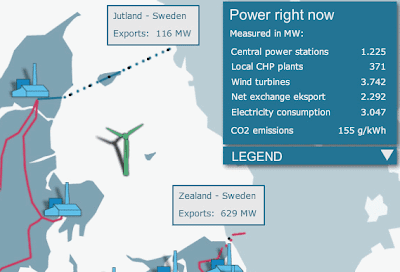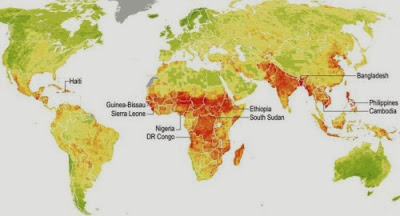Each year nations of the UN hold two weeks of talks to 'negotiate' on how, as a planet we should deal with climate change. A group called Climate Network awards a "Fossil of the Day" award to the country most backward in its approach, or that is doing the most to prevent global action on climate change.
Australia seems to pick up this award quite often. Here's the scoreboard part-way through the conference.
Here's the weird bit. In Australia, politicians like to say that their lack of action is because they are 'waiting for the rest of the world'. References are often made to the US and China.
Yet in reality, the rest of the world is doing fine. On the scoreboard of slackers, Australia is far in front. Six times as many points as China. The USA doesn't even feature.
I think when people who say we're 'waiting for the world' should have a look in the mirror, because it's this particular part of the world that is the biggest obstacle.
Friday, November 29, 2013
Thursday, November 28, 2013
Economy or Ego-nomy?
A guy at work was saying "you don't get a return for the money you spend on CFL light bulbs". So I decided to join the conversation, mentioning that a single one can save you $25 dollars per year - assuming 4 hours use each night.
He said "Sure, for those ones. But what about the ones in rooms you hardly ever use?". Later I did the math. It turns out that even a room that gets used 8 minutes a night (like a toilet for instance) is still worth switching to CFL.
But here's what I found odd. People will worry about whether it's worth buying a $3 CFL to save on energy, but are happy to pay $30,000 to $100,000 more for a house with extra rooms they obviously don't need.
That night a friend commented to me that the problem is not the economy, it's the ego-nomy. Her theory is that we could easily consume less energy and material goods - and actually be better off, psychologically and economically. But ego-nomically we might struggle. It seems that society strokes our ego only when we can point to (wastefully) expensive purchases.
I hope that changes. It would be great if the admired decisions were those which are good for us, good for society and good for the planet.
He said "Sure, for those ones. But what about the ones in rooms you hardly ever use?". Later I did the math. It turns out that even a room that gets used 8 minutes a night (like a toilet for instance) is still worth switching to CFL.
But here's what I found odd. People will worry about whether it's worth buying a $3 CFL to save on energy, but are happy to pay $30,000 to $100,000 more for a house with extra rooms they obviously don't need.
That night a friend commented to me that the problem is not the economy, it's the ego-nomy. Her theory is that we could easily consume less energy and material goods - and actually be better off, psychologically and economically. But ego-nomically we might struggle. It seems that society strokes our ego only when we can point to (wastefully) expensive purchases.
I hope that changes. It would be great if the admired decisions were those which are good for us, good for society and good for the planet.
Tuesday, November 26, 2013
100% Wind power for Denmark
On November 3 Denmark wind power produced over 100% of the nation's energy needs. The excess wind power, along with that from other energy sources, was exported to neighbours Sweden and Norway. In the future, it could be used to produce hydrogen - helping convert transport to renewable energy also.
It's inspiring to see this level of action already happening. Many countries talk about renewable energy as an energy source of the future. But Denmark are already realising the potential - and benefiting from it.
Trivia:
1. Wind had reached 93% in October.
2. Denmark has a website of live data on its energy production.
PS: I had another look later on, and the wind production was up to 123%
It's inspiring to see this level of action already happening. Many countries talk about renewable energy as an energy source of the future. But Denmark are already realising the potential - and benefiting from it.
Trivia:
1. Wind had reached 93% in October.
2. Denmark has a website of live data on its energy production.
PS: I had another look later on, and the wind production was up to 123%
See more about:
good news tuesday,
renewables,
theworld
Tuesday, November 19, 2013
Every 4 minutes
It can be sad. Climate change is a huge problem, and often it seems like we (in particular government and business) aren't doing enough (or it's happening too slowly). It can be quite depressing.
So I'm starting Good News Tuesday - at least one day per week of great or inspiring action.
This week it's the USA. On average, every 4 minutes a solar system is installed somewhere in the United States. A few have probably gone as I type these words.
I'm going to try to think about that during today. As I eat breakfast, that's another 2 systems. If I wait 4 minutes for the bus, that's another system. You get the idea. It'll be nice to remember that all the time there is positive action taking place.
That's good news.
So I'm starting Good News Tuesday - at least one day per week of great or inspiring action.
This week it's the USA. On average, every 4 minutes a solar system is installed somewhere in the United States. A few have probably gone as I type these words.
I'm going to try to think about that during today. As I eat breakfast, that's another 2 systems. If I wait 4 minutes for the bus, that's another system. You get the idea. It'll be nice to remember that all the time there is positive action taking place.
That's good news.
See more about:
good news tuesday,
renewables,
theworld
Sunday, November 10, 2013
How Climate Change hits the poor the hardest
Climate change hurts poor countries more than rich ones. This is doubly unfair, considering that these poor countries have done little to cause the problem. After writing about this for Journey magazine, I found this map of countries most likely to suffer the effects of climate change by 2025.
Red colouring indicates extreme risk from climate change. Clearly, with names like Bangladesh, Cambodia, Haiti and Ethiopia in the top 10, it's the poorest nations that are most likely to suffer - and without much financial ability to recover from disaster.
Interestingly, this analysis was done before the recent Typhoon in the Phillipines. Sadly, it seems some forecasts come true very quickly.
Red colouring indicates extreme risk from climate change. Clearly, with names like Bangladesh, Cambodia, Haiti and Ethiopia in the top 10, it's the poorest nations that are most likely to suffer - and without much financial ability to recover from disaster.
Interestingly, this analysis was done before the recent Typhoon in the Phillipines. Sadly, it seems some forecasts come true very quickly.
Monday, November 04, 2013
Energy Tales
Energy company Origin recently did a promotional campaign involving fantale-style chocolates. Given their anti-renewable comments, this parody of their chocolate wrappers amused me a little.
There is an Origin Energy petition site, asking Origin to stop undermining the Renewable Energy Target.
While being a major player in gas sector, Origin barely makes the top 20 in renewable energy.
There is an Origin Energy petition site, asking Origin to stop undermining the Renewable Energy Target.
While being a major player in gas sector, Origin barely makes the top 20 in renewable energy.
See more about:
renewables
Subscribe to:
Posts (Atom)






